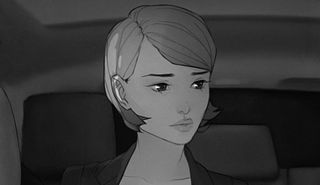Little Red Lie nails the weirdness of moving back home
A game about debt and manipulation also tells a relatable story of being an adult who is stuck with your parents.

(Note: this article contains mild spoilers for Little Red Lie. It's an unusual modern-day adventure game about debt and manipulation and you can read a less spoilery preview here.)
"You can't be an adult in the place you grew up. It isn't your job there, and you can't break up the order of things in a place where that order is everything."
The curtain has barely raised on Little Red Lie when this monologue is uttered. It articulates something many of us have likely felt while living with parents in adulthood—particularly when returning after a period of independence.
That sentiment is expressed by Little Red Lie's protagonist Sarah Stone, who finds herself approaching 40 years of age and moving back to the home she grew up in. It's a regressive move in the eyes of society, and one that leaves her uncomfortable about what people will conclude about her numerous failures—romantic, professional, and financial.
Sarah is bereft of her fragile ties to adulthood, losing her job and being forced to sell her house, but she doesn't reveal this to her parents. Instead she clings to the clothes and the routine, getting ready for the office every day but instead going to the coffee shop. She is a normal adult, and nobody can prove otherwise.

Sarah maintains a set of Very Adult Reasons for being back home: she's providing support to her ageing parents; it's merely short-term while she gets back on her feet. These kinds of lies are what the story really revolves around, and the game betrays any dishonest thought or line of dialogue by highlighting it in red.
But Sarah also spent her happiest years in this place, which obviously brings with it a comforting familiarity. This is best shown in a sequence when Sarah sets out on a late-night hunt for the family cat, navigating the well-trodden carpets in complete darkness with an ease that only decades of knowing a place intimately can bring.
The biggest gaming news, reviews and hardware deals
Keep up to date with the most important stories and the best deals, as picked by the PC Gamer team.
Little Red Lie is the latest slice of interactive fiction from Canadian writer and developer Will O'Neill. Never one to shy away from the darker and more painful aspects of modern life, he previously explored depressive thirtysomething aimlessness in Actual Sunlight.
"The whole experience of Sarah's family life is meant to illustrate the duality of her regret at being there while also her comfort and familiarity in that space," O'Neill tells me. "And her reluctance in a lot of ways to be anywhere else."
"Doing that thing where she knows where everything is in the dark is a sense of enormous comfort to her, even if she is still somewhat ashamed to be there. I also wanted to give a sense of Sarah having been happier at an earlier point in her life, looking back on all those memories in kind of an innocent way—the photographs, her grandmother's old couch, even the board games—just those things that are endearing. I wanted to paint a picture of Sarah that was more than just 'I hate being back at home, it sucks.' I wanted to really get into the nuance of her unhappiness, but also her security and her comfort."
But Sarah herself would never readily admit to this comfort.

Her parents, at least, seem to believe Sarah's little red lie. The pretence of having her shit together is given a boost by favourable comparisons to her sister, who also lives in the house. Spoken of in hushed tones, Melissa is an amalgam of all the worst millennial stereotypes. She lives in her parents' basement, she plays videogames, she's unemployed, she's financially dependent, she's ungrateful, and she has mental health issues.
Having the basement kitted out as a full 'apartment' for her so that she never even needs to go upstairs, Melissa is in no position to adopt Sarah's argument that this is just a short-term situation. For Melissa, this is her life, and when it's dark this is her home.
"By night-time, I tried to give a sense of the house being almost flipped and becoming more her domain," says O'Neill of Melissa and her nocturnal habits. "Nobody even mentions Sarah's sister by name until Sarah's literally in the basement talking to her and says her name to stop her from going back into her room. I really tried to give an almost horror influence, to make her not just a millennial in the basement, but also kind of a monstrous figure. People don't want to mention her name, they don't want to talk about her. There are all these things about her that are unspoken. In this house you have memories, but it also hides secrets."

This idea is further strengthened when Sarah's father is taken into hospital. He reacts with alarm when Sarah tells him that her also-ill mother is alone in the house with Melissa. He orders that Sarah return home immediately, as though Melissa is not his daughter but some high-risk felon. Sarah attempts to dispel these fears by telling him that everything will be fine, but the red lettering of these reassurances reveals that even she isn't so sure.
There's much more to Little Red Lie than what goes on in the Stone household. Second protagonist Arthur Fox is a motivational speaker and business guru, giving O'Neill the scope to look at both sides of the growing financial power divide and what it's doing to us psychologically. But to me it's that unassuming house, at once a prison and a warm blanket, that highlights O'Neill's impressive knack for capturing modern anxieties.
As an adult you know how stuff's done. You're pretty confident you can work the washing machine without flooding the place. But in the home where you were a child these will always feel like jobs for the proper grown-ups. And as long as you're there, you're not one of them.
Most Popular


